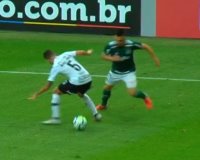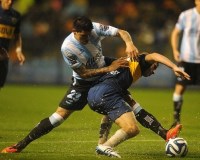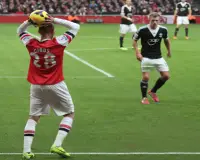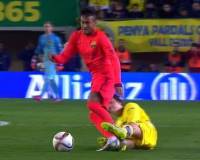Blog
The Main Soccer/Football Vocabulary in Portuguese
- Thursday June 18th, 2020
- Posted by: Amanda Ennes
- Category: Learn the Portuguese Language and Portuguese Grammar
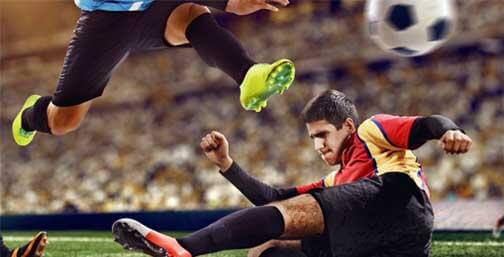
Brazil loves football — we call it a national passion. It is very common to see people discussing football during friendly meetings, taxi rides, bus stops, and happy hours. We know how much our students love to practice Portuguese with locals as much as they can. That’s why if you love football you should learn the main football vocabulary in Portuguese to practice when you have the chance.
We are sure your Brazilian friends will love to talk about football with you, especially knowing you understand all the football slang and vocabulary.
Table of Contents
ToggleCheck the main soccer/football vocabulary in Portuguese:
Acréscimos
Extra minutes added to the end of each half time to compensate for the lost time during the game due to injury or fouls.
Artilheiro
The player who scored the most in a game or for a team in general. The top scorer.
Bicicleta
An acrobatic strike in which the player kicks the ball rearward in midair.
Camisa 10
The most important player on the team. It doesn’t matter if they use the number 10 on their jersey or not.
 Caneta
Caneta
It is the name of the action when a player kicks the ball between the opponent’s legs. Caneta in Portuguese means ‘pen’, which the opponent’s legs are compared to.
Carrinho
It is when a defender of a team tries to push the ball away from the opposing player by leaping forward with an extended leg. This is a risky tackle move often considered a foul when the defender does not perform it correctly by the rules.
Chapéu
When the player kicks the ball high into the air aiming to pass it over the opponent’s head. In Portuguese, chapéu means ‘hat’.
Drible
A technical maneuver used by the player of a team to make the ball go past the opponents. A dribbling move.
Escanteio
If the ball goes out of play over the goal line, having last been touched by a member of the defending team, the game is restarted. That occurs by a player of the offensive team kicking the ball from the corner of the field nearest to where it went out. This procedure is called escanteio.
 Falta
Falta
When a player commits a misconduct act which the referee considers to be unfair or against the football rules.
Frango
This happens when the goalkeeper can’t defend a goal from an easily defensible shot. Funny thing is frango means chicken in Portuguese. Interesting football vocabulary in Portuguese, huh?
Gaveta
To kick the ball in the upper right or left angle of the post and score the goal.
Impedimento
The offside, one of the Laws of the Game. It occurs when an attacker of the opposing team is closer to the goal line than the second-last opponent and also the ball. If said attacker commits this fault, we say they are ‘impedido’.
Lambreta
A rainbow kick. It is a trick used in football when a player steps to the side of the ball and flicks it up round from the side of them.
 Lateral
Lateral
It is a method of restarting the game after the ball exits the side of the field.
Passe
The action of passing the ball for another player of your team.
Pelada
A casual football match between friends.
Pênalti
A direct free kick foul committed by a team within its own penalty area.
Placar
The score of the game.
Prorrogação
Some games can not end in a tie, because a winner is required. If the game is still tied after the 90-minute ordinary time, two extra 15-minute periods are given as overtime. That extra time is called prorrogação in Portuguese.
 Tesoura
Tesoura
As mentioned above, if the carrinho tackle goes wrong and the defensor commits a foul, their legs might block the opposite player, making them fall. When a sliding tackle goes wrong, it is called a tesoura, because both legs of the defensor player hold the legs of the attacker, preventing them to move.
Tiro de meta
It is a method of restarting the game when the ball leaves the field completely from the end line having been last touched by an opposing attacking player. The goalkeeper is usually the one that kicks the ball back to the game.
Trave/Travessão
Trave is the vertical posts of the goal. And travessão is the top horizontal bar of the goal post.
Now you know the main football vocabulary in Portuguese and can have a great conversation with your friends. Don’t forget to keep studying Portuguese to improve your general vocabulary and conversation skills. Caminhos Language Centre can help you with private Portuguese lessons tailored to your needs and interests. Book your classes now and our team of native teachers will make sure to prepare the perfect Portuguese class for you!
Furthermore, if you’ve enjoyed learning new football vocabulary in Portuguese, you might also like our recent blog post The Top Brazilian Clubs: Understanding Brazilians’ Passion for Football. Check it out!


 Deutsch
Deutsch Français
Français Português
Português Español
Español